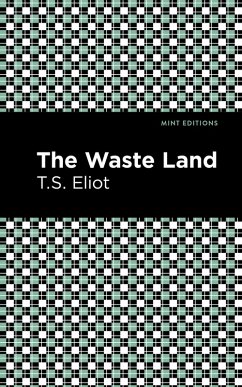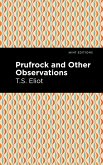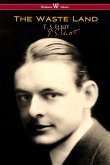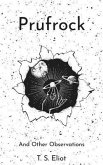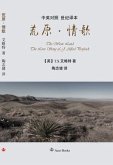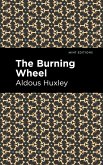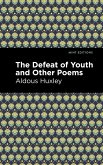The Waste Land (1922) is a poem by T.S. Eliot. After suffering a nervous breakdown, Eliot took a leave of absence from his job at a London bank to stay with his wife Vivienne at the coastal town of Margate. He worked on the poem during these months before showing an early draft to Ezra Pound, who helped edit the poem toward publication. The Waste Land, dedicated to Pound, includes hundreds of quotations of and allusions to such figures as Homer, Sophocles, Virgil, Ovid, Dante, Saint Augustine, Chaucer, Baudelaire, and Whitman, to name only a few.
Divided into five sections-"The Burial of the Dead;" "A Game of Chess;" "The Fire Sermon;" "Death by Water;" and "What the Thunder Said"-The Waste Land is a complex poem that translates Eliot's fragile emotional state and increasing dissatisfaction with married life into an apocalyptic vision of postwar England. The poem begins with a meditation on despair before moving to a polyphonic narration by figures on the theme. The third section focuses on death and denial through the lens of eastern and western religions, using Saint Augustine as a prominent figure. Eliot then moves from a brief lyric poem to an apocalyptic conclusion, declaring: "He who was living is now dead / We who were living are now dying / With a little patience." Both personal and universal, global in scope and intensely insular, The Waste Land changed the course of literary history, inspiring countless poets and establishing Eliot's reputation as one of the foremost artists of his generation.
This edition of T.S. Eliot's The Waste Land is a classic of English literature reimagined for modern readers.
Since our inception in 2020, Mint Editions has kept sustainability and innovation at the forefront of our mission. Each and every Mint Edition title gets a fresh, professionally typeset manuscript and a dazzling new cover, all while maintaining the integrity of the original book.
With thousands of titles in our collection, we aim to spotlight diverse public domain works to help them find modern audiences. Mint Editions celebrates a breadth of literary works, curated from both canonical and overlooked classics from writers around the globe.
Divided into five sections-"The Burial of the Dead;" "A Game of Chess;" "The Fire Sermon;" "Death by Water;" and "What the Thunder Said"-The Waste Land is a complex poem that translates Eliot's fragile emotional state and increasing dissatisfaction with married life into an apocalyptic vision of postwar England. The poem begins with a meditation on despair before moving to a polyphonic narration by figures on the theme. The third section focuses on death and denial through the lens of eastern and western religions, using Saint Augustine as a prominent figure. Eliot then moves from a brief lyric poem to an apocalyptic conclusion, declaring: "He who was living is now dead / We who were living are now dying / With a little patience." Both personal and universal, global in scope and intensely insular, The Waste Land changed the course of literary history, inspiring countless poets and establishing Eliot's reputation as one of the foremost artists of his generation.
This edition of T.S. Eliot's The Waste Land is a classic of English literature reimagined for modern readers.
Since our inception in 2020, Mint Editions has kept sustainability and innovation at the forefront of our mission. Each and every Mint Edition title gets a fresh, professionally typeset manuscript and a dazzling new cover, all while maintaining the integrity of the original book.
With thousands of titles in our collection, we aim to spotlight diverse public domain works to help them find modern audiences. Mint Editions celebrates a breadth of literary works, curated from both canonical and overlooked classics from writers around the globe.
Dieser Download kann aus rechtlichen Gründen nur mit Rechnungsadresse in A, D ausgeliefert werden.

